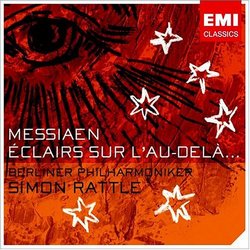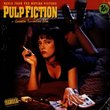| All Artists: Olivier Messiaen, Simon Rattle, Berlin Philharmonic Orchestra Title: Olivier Messiaen: Éclairs sur l'Au-delà Members Wishing: 1 Total Copies: 0 Label: EMI Classics Release Date: 10/5/2004 Genre: Classical Styles: Historical Periods, Modern, 20th, & 21st Century, Symphonies Number of Discs: 1 SwapaCD Credits: 1 UPC: 724355778826 |
Search - Olivier Messiaen, Simon Rattle, Berlin Philharmonic Orchestra :: Olivier Messiaen: Éclairs sur l'Au-delà
 | Olivier Messiaen, Simon Rattle, Berlin Philharmonic Orchestra Olivier Messiaen: Éclairs sur l'Au-delà Genre: Classical
Éclairs sur l'au-dela (Illuminations of the Beyond) was Messiaen's last work. It shares with his other large-scale orchestral pieces a sense of otherworldly grandeur, obsessively repeated rhythmic and melodic patterns... more » |
Larger Image |
CD DetailsSynopsis
Amazon.com Éclairs sur l'au-dela (Illuminations of the Beyond) was Messiaen's last work. It shares with his other large-scale orchestral pieces a sense of otherworldly grandeur, obsessively repeated rhythmic and melodic patterns, birdcalls, and a riot of orchestral color, among much else. Its eleven movements address different aspects of the title and, like virtually everything Messiaen wrote, could not be mistaken for any other composer. Rattle and the Berlin Orchestra deliver a skilled, dynamic rendition, steering clear of the kitschy implications of sections where Messiaen skirts the edges of kitsch (enjoyable as they may be). Unexpectedly, the Berliners sound at home in this music, with some terrific solo and section contributions, and special kudos due to the percussionists and winds, especially the flutes, whose birdcalls resound throughout the work. Transparent engineering uncovers details in the score, further making this a delight for Messiaen fans. --Dan Davis Similarly Requested CDs
|
CD ReviewsMYSTIC, WONDERFUL DAVID BRYSON | Glossop Derbyshire England | 12/26/2004 (5 out of 5 stars) "Music lovers who have so much as a nodding acquaintance with the work of Messiaen will have a very fair idea of what to expect from these Eclairs (flashes of illumination), written right at the end of his long life. Messiaen was in the Catholic tradition of mysticism, and he found the manifestation of the godhead on earth largely in the contemplation of birdlife and birdsong. He was also a virtuoso of the orchestra much as Tennyson was a virtuoso of the English language, and when I listen to this marvellous work I keep thinking tangentially of the arm that rose from the lake to reclaim Excalibur `clad in white samite, mystic, wonderful'. It's unfair to Messiaen in a minor way, because Messiaen's mysticism and religious faith were genuine and deep-seated; but the spectacular technical skill of his orchestral writing is every bit as important to the hearer, and these Illuminations of the Far Side are nearly as systematic a demonstration of the orchestra as Britten's Young Person's Guide to same. You will get a few insights into the work from the accompanying liner note by Roger Nichols, but I have to report that his illuminations are fewer and less illuminating than they ought to have been. It's more than slightly lazy-minded, which might not have bothered me if this had been some familiar classic but which is downright objectionable in relation to a work that is crying out for informed comment. Here we have 11 pieces bearing religious titles. These titles give us the key (presumably) to the composer's inspiration in each case. Mr Nichols takes more than half the brief space available to him in a leisurely discussion of the composer's fascination with prime numbers and the fact that this is one of three works by him that have an American association. These issues are neither here nor there, and as space has run out we have to make do, when it comes to the seventh piece, with the revelation that it makes much of the chord of D major. How different it would have been, one assumes, if it had made much of the chord of E flat major or C sharp major. And it is simply rubbish to say `Finally, though, Paradise is attained'. The theme of this work is not the Divine Comedy or Faust, and the music is not Mahler's 8th. The final number here is just another part of the composer's overall mental concept, and it is something that the right sort of atheists are likely to understand and respond to better than the wrong kind of people of faith. Happily, the performance and recording are simply superlative. Is Rattle the greatest conductor alive in 2004? I suspect so. The Berlin Phil seem to be back to their Karajan-era infallibility, but now under musical direction that I for one rate far above Karajan. I recommend this disc both to experienced enthusiasts for Messiaen and to interested newcomers. This music is neither traditional on the one hand nor forbidding on the other. It is a glorious display of sumptuous sound, and it is inclusive - it doesn't speak only or even mainly to those who share the composer's own vision. The recording sounds as if there was nothing to it, an effortless and unmanipulated reproduction of superlative playing in a huge score. Les Elus marques du sceau, all of them." Some of Messiaen's most glorious and clever music, but bogge Christopher Culver | 02/17/2007 (3 out of 5 stars) ""Eclairs sur l'au dela" for orchestra is Messiaen's last work, with the exception of a minor concerto for four musicians that had to be completed by George Benjamin. Messiaen wrote these "illuminations of the here-after" between 1987 and 1991, and the work was premiered in late '92, six months after the composers death. For a long time only one recording was easily accessible, by the Bastille Opera Orchestra and Myung-Whun Chung on Deutsche Grammophon. But here on this 2004 EMI disc, Simon Rattle and the Berliner Philharmoniker give a strong performance of the work. The work really does have all the features Messiaen is known for among its eleven movements. A long, bright brass chorale opens the work, an "Apparition of the Glorious Christ". Birdsong fills the second and third movements, while the fifth, "Abiding in love" is a long, slow adoration. The seventh movement, "The Seven Angels with the Seven Trumpets" is the most striking of the work. While Messiaen's treatment of this theme in his celebrated "Quartet for the End of Time" was a joyful dance, here it's a grim and threatening cadence marked by the occasional beating of a timpani in the wings. Certain parts of "Eclairs" are among Messiaen's best writing. However, as a whole it suffers from a problem common to much of the composer's work: it's overlong. Most of the first half of the work is perfectly timed, even the five-minute brass chorale that opens "Eclairs" and the ten-minute "Abiding in Love" work in spite of their limited musical material. However, everything from the seventh movement seems dull and often directionless. At these moments, even the most dedicated fan of Messiaen finds his attention wandering. One's listening to the work is likely to be through skipping from track to track for the good stuff, ignoring a fairly large portion entirely. This particular performance by the Berliner Philharmoniker and Simon Rattle is the best around. In terms of sound quality it easily beats the DG recording, and Rattle (as any who have seen him conduct the piece know) is extremely passionate about "Eclairs" and gives it his all as no other conductor. The liner notes are only average, fans of the composer should pick up Peter Hill and Nigel Simeone's MESSIAEN: A Life in Words and Pictures (Yale University Press, 2005) which the notes make reference to. If you are a total Messiaen newbie, I'd recommend starting with the TASHI Ensemble's performance of "Quatuor pour la fin du Temps", one of the most extraordinary CDs in my collection. But "Eclairs" has much brillance, in spite of its tendency to go on and on, and should be one of the first discs you purchase once you know you like this great French composer." Neither Messian nor Rattle at their best - but not far away G.D. | Norway | 11/27/2008 (4 out of 5 stars) "Éclairs sur l'au-delà is Messiaen's last work, and it includes most of the Messiaenic signature elements; complex rhythms, birdcalls, opulent harmonic compounds etc. Still, this is in my opinion not among Messiaen's best works, and frankly he seems at several points to revert to some of his standard tricks in the absence of something novel to say. Still, the richness of colors and staggering sonic allure (an oxymoron, but I suspect people who know their Messiaen will know what I mean) of the music will never really disappoint anyone who has ever been hypnotized by Messiaen.
Rattle has, as is apparently required of a star conductor, his own views about the music and makes several interesting choices regarding e.g. tempi. The Berlin Philharmonic expectedly brushes most relevant competition aside in terms of sheer magnificence of sound, although there is arguably some lack of power in the brass. The whole thing still sounds a tad ... anonymous, despite the said original choices in terms of tempo and perspective. The sound is detailed but lacks the last touch of opulence that Messiaen ideally requires." |

 Track Listings (11) - Disc #1
Track Listings (11) - Disc #1








